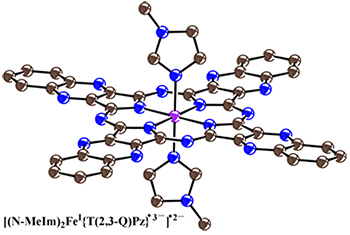Журнал "Макрогетероциклы"
Navigation
News
Impact Factor 2021 = 1.200 has been issued by ISI Web of Knowledge (JCR 2021).
Search
ISSN 1998-9539
Molecular Structure, Optical and Magnetic Properties of Iron Tetra(2,3-quinoxalino)porphyrazine [(N-MeIm)2FeI{T(2,3-Q)Pz}•3-]}•2- Radical Dianions
Maxim A. Faraonov,a@1 Nikita R. Romanenko,a,b Alexey V. Kuzmin,c Dmitri V. Konarev,a@2 Salavat S. Khasanov,c and Rimma N. Lyubovskayaa
aInstitute of Problems of Chemical Physics RAS, 142432 Chernogolovka, Russia
bMoscow State University, 119991 Moscow, Russia
cInstitute of Solid State Physics RAS, 142432 Chernogolovka, Russia
@1Corresponding author E-mail: maksimfaraonov@yandex.ru
@2Corresponding author E-mail: konarev3@yandex.ru
DOI: 10.6060/mhc190451f
Macroheterocycles 2019 12(2) 202-208
Iron(II) tetra(2,3-quinoxalino)porphyrazine, FeIIT(2,3-Q)Pz, was obtained using diaminomaleonitrile and o-phenylenediamine as starting materials. Reduction of FeIIT(2,3-Q)Pz by sodium fluorenone ketyl in the presence of cryptand[2.2.2] and N-methylimidazole followed by precipitation of crystals leads to crystalline salt {cryptand[2.2.2](Na+)}2×[(N-MeIm)2FeI{T(2,3-Q)Pz}·3-]·2-×3C6H4Cl2×2H2O (1). Molecular structure and properties of the [(N-MeIm)2FeI{T(2,3-Q)Pz}·3-]·2- radical dianions have been studied. Reduction of FeIIT(2,3-Q)Pz is accompanied by strong blue shift of Soret band in spectrum of 1 but Q-band has close position to that in the spectrum of neutral macrocycle. There is an alternation of the C-Nmeso bonds in the macrocycle in 1, the difference between short and long C-Nmeso bonds of 0.017 Ȧ supports the formation of radical trianionic T(2,3-Q)Pz·3- macrocycle. Coordination of N-methylimidazole molecules to iron (I) atoms with the Fe–N(imidazole) distance of 1.999(7) Ȧ is observed. Both FeI atom and radical trianionic {T(2,3-Q)Pz}3·-macrocyclecontribute to the EPR signal of1, which is well interpreted as the superposition of Lorentzian shapedlines with g1 = 2.0917, g2= 2.0679, g3 = 2.0292, g4 = 1.9991 and g5 = 1.9922. The lines with higher g-factor (g1 and g2) value can be attributed to low spin (S = 1/2) FeI whereas the lines with lower g-factor (g4 and g5) values can be attributed to the radical trianionic {T(2,3-Q)Pz}·3- macrocycle. The line with intermediate g-factor value (g3) can originate from the contribution of both components. The value of effective magnetic moment at 300 K (2.32 mB) indicates a contribution of two non-interacting S = 1/2 spins from iron(I) atoms and radical trianionic {T(2,3-Q)Pz}·3- macrocycle. These spins weakly antiferromagnetically interact with Weiss temperature of –3 K.

| Attachment | Size |
|---|---|
| mhc190451f.pdf | 1.15 MB |
| mhc190451f_supp.pdf | 260.08 KB |
- 1294 reads
- Русский
